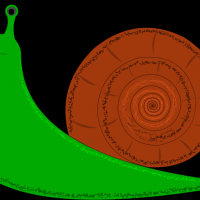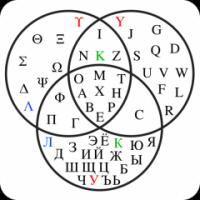Postitused: 14
Keel: English
sudanglo (Näita profiili) 9. veebruar 2013 10:56.51
But what of sentences like the book that I saw you steal or the lecture that I heard you give?
hebda999 (Näita profiili) 9. veebruar 2013 19:19.18
sudanglo:Purists will immediately object, saying that you must say la libro, kiun mi donis al vi though the meaning of the offending phrase is incontrovertible.Zamenhof used similar concepts:
But what of sentences like the book that I saw you steal or the lecture that I heard you give?
inviti Parizon kelkajn plej gravajn esperantistojn
the book that I saw you steal = la libro, kiun mi vidis ke vi ŝtelis
Kirilo81 (Näita profiili) 9. veebruar 2013 20:04.54
sudanglo:The crucial thing with these is the presence of a second verb from which a second direct object can depend, while there is nothing like this in the ungrammatical sentence in the title. There are no ditransitive verbs in Esperanto.
But what of sentences like the book that I saw you steal or the lecture that I heard you give?
Ganove (Näita profiili) 10. veebruar 2013 0:48.28
sudanglo:Purists will immediately object, saying that you must say la libro, kiun mi donis al vi though the meaning of the offending phrase is incontrovertible.I agree with you, the meaning should be clear and everybody would understand what you want to say and the mistake is just a little grammatical inaccuracy.
But thinking of English, when I ask someome "How are you?" most of them reply "I'm good." and not the grammatical correct way "I'm well.", so "La libro, kiun mi vin donis" could work as colloquial Esperanto to my mind.
sudanglo:But what of sentences like the book that I saw you steal or the lecture that I heard you give?"the book that I saw you steal" and "the lecture that I heard you give" contain reduced relative clauses.
Splitting the relative clauses, we get:
the book <- You stole it. <- I saw you (doing so).
the lecture <- You gave it. <- I heard you (doing so).
Here both sentences contain two relative clauses which are nested into each other.
Re-building them:
I saw you stealing the book.
I heard you giving the lecture.
Converting the direct objects to subjects:
The book, (which) I saw you stealing,...
The lecture, (which) I heard you giving,...
Applying the same pattern on "La libro, kiun mi vin donis":
La libro <- Mi donis ĝin al vi.
Here we have just one relative clause.
Re-building it:
Mi donis la libron al vi.
Converting the direct object to subject, we get those two possibilities:
La libro, kiun mi donis al vi,...
La libro, kiun mi vin* aldonis,...
*The "vi" has to be an accusative when using a "prepositional prefix + verb" construction.
Kirilo81:[...] There are no ditransitive verbs in Esperanto.There are ditransitive verbs in Esperanto, for example "doni ion al iu", you neither can drop "ion" nor "al iu" without changing the phrase's meaning or going against grammatical rules, since "doni" requires both a direct and an indirect object.
brodicius (Näita profiili) 10. veebruar 2013 5:30.00
The book, to which I gave you.
Certainly, context dictates that this would be a bit strange. But assumedly this applies to more than you and a book.
matrix (Näita profiili) 10. veebruar 2013 5:32.14
sudanglo:Purists will immediately object, saying that you must say la libro, kiun mi donis al vi though the meaning of the offending phrase is incontrovertible.“La libro, kiun mi vin donis.” [The book that I gave you.] is understandable but not correct ‒ except perhaps in a spoken, colloquial or artistic language.
It may be “La libro, kiun mi donis al vi.” or “La libro, pri kiu mi vin donis.” or “La libro, pri kiu mi donis al vi.”
Do notice the reversed functions of the direct and indirect objects in the first two sentences without losing the meaning.
In Esperanto, in a given clause, a verb cannot have two direct objects, so you may need to add a preposition to fulfill this rule.
But, in some cases, you can take out prepositions without losing the meaning, or even add some as well:
“Mi skribas al vi.” [I am writing to you.] → “Mi vin skribas.”, “Mi vin alskribas.”;
“Mi vin telefonas.” [I am phoning you.] → “Mi telefonas al vi.”
However, it is advised to know whether a verb is transitive or intransitive.
sudanglo:But what of sentences like the book that I saw you steal or the lecture that I heard you give?“The book that I saw you steal.” → “La libro, pri kiu mi vidis vin ŝteli.”, “La libro, kiun mi vidis ŝteli de vi.”, “La libro, kiun mi vidis, kiam tiun vi ŝtelis.”
“The lecture that I heard you give.” → “La prelego, pri kiu mi aŭdis vin fari.”, “La prelego, kiun mi aŭdis fari de vi.”, “Via prelego, kiun mi aŭdis.”, “La prelego, kiun mi aŭdis, kiam tiun vi faris.”
Kirilo81 (Näita profiili) 10. veebruar 2013 9:29.07
Sorry for screaming, but there are certain limits of linguistic nihilism I can accept.
Ganove:In my understanding ditransitivity (at least in a narrow sence) implies the same morphological encoding for both direct and indirect object. You find this in English, Indonesian etc. but not in Esperanto. Of course the valency of doni postulates three arguments, within these two objects.Kirilo81:[...] There are no ditransitive verbs in Esperanto.There are ditransitive verbs in Esperanto, for example "doni ion al iu", you neither can drop "ion" nor "al iu" without changing the phrase's meaning or going against grammatical rules, since "doni" requires both a direct and an indirect object.
sudanglo (Näita profiili) 10. veebruar 2013 11:13.39
But isn't it true that in some sense that in 'the book that I saw you stealing' the verb to see has two objects, the thief and the act of stealing - three if you include the object stolen as seen.
I haven't checked the Tekstaro but I find la libro, kiun mi vidis, ke vi ŝtelis somewhat unnatural, preferring la libro kiun mi vidis vin ŝteli/mi vin vidis ŝteli.
Perhaps I was having a senior moment (it has been known) and there is no puzzle or inconsistency, and also no link to the issue we recently discussed of how to say things like Who did he say stole the book/was the thief?.
Ganove (Näita profiili) 10. veebruar 2013 13:26.49
So if it cannot be colloquial maybe it could be a sociolectical style or an idiom.
For instance in Berlinerisch dialect one would say 'Ick liebe dir.' (='I love to you.' like the to you in 'I give it to you.' ) .
Of course every non-Berlinerisch speaker would feel that this sounds wrong, since it actually should be 'dich' (=I love you.).
So if there were a group which uses 'kiun mi vin donis', they would create a sociolect.
Of course, this is just purely hypothetical, I do not want to either suggest its ussage or create a sociolect.
I just speculated on that.
Kirilo81:In my understanding ditransitivity (at least in a narrow sence) implies the same morphological encoding for both direct and indirect object. You find this in English, Indonesian etc. but not in Esperanto. Of course the valency of doni postulates three arguments, within these two objects.Then I probablby misunderstood this sentence 'Duoble transitiva verbo estas verbo, kiu devige havas tri argumentojn: subjekto, rekta objekto, kaj nerekta objekto.' [source url=http://eo.wikipedia.org/wiki/Duoble_transitiva_verbo]Vikipedio[/url]] which I thought that it would mean 'Ditransitive verbs are verbs, which have to have three arguments: a subject, a direct object and an indirect object.'
Ganove (Näita profiili) 10. veebruar 2013 13:29.41
sudanglo:But isn't it true that in some sense that in 'the book that I saw you stealing' the verb to see has two objects, the thief and the act of stealing - three if you include the object stolen as seen.Hm, I don't think so.
'you stealing' acts as an adverbial relative clause in the view of 'saw'.
'to see' requieres one object. If you ask for the object 'What did I see?', how you stole the book is the entire object (here it is a fused relative clause) of 'saw' in the sentence 'I saw how you stole the book'.
Coming back to your clause 'The book, that I saw you stealing' :
Here we have a subject 'The book' with its relative clause 'that I saw you stealing'.
A relative clause describes a main clause element.
'that' refers to 'the book', it connects the subject of the main clause with the object of the relative clause.
If 'that' didn't introduce the relative clause, it would be positioned at the clause's end: 'I saw you stealing that'
Here we have a main clause and a relative clause:
The main clause is 'I saw you' and the relative clause is 'stealing that' or converted 'who stole that'
Every relative clause is like a closed box, if your are inside the box you can see the subjects, the predicate (the verb) and its object, but if you are outside you can't see just the box.
If you are in a house you could see the kitchen, the bathroom and the living room, but if you stands in front of the house you just see the house. You probablby know that there might be a kitchen, a bathroom and a living room inside the house but you can't see them.
So, coming back to 'the book that I saw you stealing', the book cannot 'know' either by whom it was stoles or that I saw the thief.



